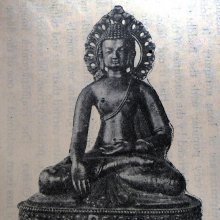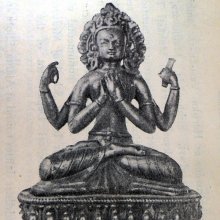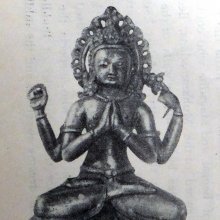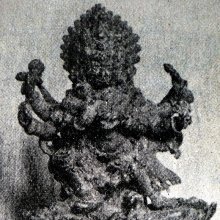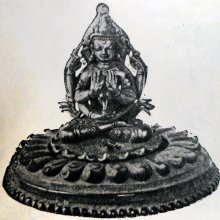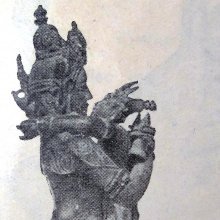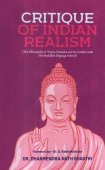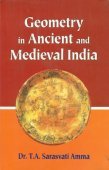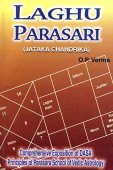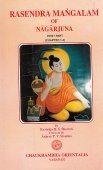Pandita, Paṇḍita, Paṇḍit, Paṇḍitā, Pandit: 32 definitions
Introduction:
Pandita means something in Buddhism, Pali, Hinduism, Sanskrit, Jainism, Prakrit, the history of ancient India, Marathi, Hindi. If you want to know the exact meaning, history, etymology or English translation of this term then check out the descriptions on this page. Add your comment or reference to a book if you want to contribute to this summary article.
Images (photo gallery)
(+7 more images available)
In Hinduism
Vaishnavism (Vaishava dharma)
Source: ISKCON Press: GlossaryPaṇḍita (पण्डित).—A scholar learned in Vedic literature, not only academically but also by dint of spiritual realization. Though this is the proper definition of the word, the term is also loosely applied to any scholar.
Source: Pure Bhakti: Bhagavad-gita (4th edition)Paṇḍita (पण्डित) refers to “learned scholar”. (cf. Glossary page from Śrīmad-Bhagavad-Gītā).
Source: Pure Bhakti: Brhad BhagavatamrtamPaṇḍita (पण्डित) refers to:—A learned person. (cf. Glossary page from Śrī Bṛhad-bhāgavatāmṛta).

Vaishnava (वैष्णव, vaiṣṇava) or vaishnavism (vaiṣṇavism) represents a tradition of Hinduism worshipping Vishnu as the supreme Lord. Similar to the Shaktism and Shaivism traditions, Vaishnavism also developed as an individual movement, famous for its exposition of the dashavatara (‘ten avatars of Vishnu’).
Vyakarana (Sanskrit grammar)
Source: Wikisource: A dictionary of Sanskrit grammarPaṇḍita (पण्डित).—Writer of Citprabhā, a commentary on the Paribhāșenduśekhara. A commentary on the Laghuśabdenduśekhara is also ascribed to him. He was a Gauda Brāhmaṇa whose native place was Kurukșetra. He lived in the beginning of the nineteenth century.

Vyakarana (व्याकरण, vyākaraṇa) refers to Sanskrit grammar and represents one of the six additional sciences (vedanga) to be studied along with the Vedas. Vyakarana concerns itself with the rules of Sanskrit grammar and linguistic analysis in order to establish the correct context of words and sentences.
Purana and Itihasa (epic history)
Source: archive.org: Shiva Purana - English TranslationPaṇḍita (पण्डित) refers to “wise counsellors”, according to the Śivapurāṇa 2.3.31 (“Description of Śiva’s magic”).—Accordingly, as Śiva (in disguise of a Brahmin) said to the Lord of Mountains: “[...] For the marriage of Pārvatī, He is not at all a deserving person. On hearing of this, the general public will smile in derision. O lord of mountains, see for yourself. He has not a single kinsman. You are the storehouse of great gems and jewels. He has no assets at all. O lord of mountains, you shall consult your kinsmen, sons, wife and wise counsellors (paṇḍita), except Pārvatī. O lord of mountains, the medicine does not appeal at all to the patient. Wrong diet that brings about great defects always appeals to him”.

The Purana (पुराण, purāṇas) refers to Sanskrit literature preserving ancient India’s vast cultural history, including historical legends, religious ceremonies, various arts and sciences. The eighteen mahapuranas total over 400,000 shlokas (metrical couplets) and date to at least several centuries BCE.
Yoga (school of philosophy)
Source: ORA: Amanaska (king of all yogas): A Critical Edition and Annotated Translation by Jason BirchPaṇḍita (पण्डित) refers to “one who is learned” (as opposed to Apaṇḍita—‘unlearned persons’), according to the Amanaska Yoga treatise dealing with meditation, absorption, yogic powers and liberation.—Accordingly, as Īśvara says to Vāmadeva: “[...] [Those] unlearned, religious deviants who have abandoned their Vedic rites in vain, think [themselves] to be learned (paṇḍita). They know nothing. The Yogin does not abandon rites. For, [in the no-mind state] he is abandoned by rites, simply because of the cessation of volition, [which] is the root cause of [all] rites. [...]”.

Yoga is originally considered a branch of Hindu philosophy (astika), but both ancient and modern Yoga combine the physical, mental and spiritual. Yoga teaches various physical techniques also known as āsanas (postures), used for various purposes (eg., meditation, contemplation, relaxation).
Shaiva philosophy
Source: Google Books: The Recognition SutrasPandit families in Kashmir traditionally preserved many Tantrik manuscripts, such as the 11th century Pratyabhijñāhṛdaya.—Kashmir has been under many rulers. In the three centuries after Kṣemarāja (11th century), the Muslims invaded again and again, regularly looting and destroying temples, holy places, and monasteries, believing as they did that all non-Muslim religion was an offense to God. In this period, untold numbers of Śaiva Tantrik manuscripts written in Sanskrit were destroyed, but many were saved, held by devoted Kashmiri Pandit families and passed down reverently, whether or not anyone in the family could read them. [..] When Sir Pratap Singh Sahib Bahadur assumed his throne in 1885, there were only about forty Shaiva Pandit families left in the region (it was these families whose duty it was to preserve the ancient knowledge). Fortunately, these families held a substantial number of manuscripts of original Tantrik texts.
-
Ayurveda (science of life)
Rasashastra (Alchemy and Herbo-Mineral preparations)
Source: History of Science in South Asia: Making Gems in Indian Alchemical LiteraturePaṇḍita (पण्डित) refers to “wise ones”, according to the Vādakhaṇḍa section of the Rasaratnākara (lit. “jewel mine of mercury”): a 13th century alchemical work in Sanskrit written by Nityanātha.—Accordingly, “In the world of rebirth, very abundant wealth is indeed the most excellent thing, producing all pleasures; that is to be attained by lords of Sādhakas. According to the method from the mouth of the teacher, specifically the manufacture of jewels, etc., and the auspicious lore of perfumery is related here for the purpose of attaining it. For, having understood everything, those various things are easily attained, being in the direct experience [and] purifying for wise ones (paṇḍita)”.

Āyurveda (आयुर्वेद, ayurveda) is a branch of Indian science dealing with medicine, herbalism, taxology, anatomy, surgery, alchemy and related topics. Traditional practice of Āyurveda in ancient India dates back to at least the first millenium BC. Literature is commonly written in Sanskrit using various poetic metres.
General definition (in Hinduism)
Source: WikiPedia: HinduismPaṇḍita was a title in Indian Buddhism awarded to scholars who have mastered the five sciences (Sanskrit: pañcavidyāsthāna) in which a learned person was traditionally supposed to be well-versed.
The five sciences are:
- science of language (śabdavidyā),
- science of logic (hetuvidyā),
- science of medicine (cikitsāvidyā),
- science of fine arts and crafts (śilakarmasthānavidyā),
- and science of spirituality (adhyātmavidyā).
The stipulation can be traced to (but may well predate) the Mahāyāna-sūtrālamkāra-kārikā, which states: "Without becoming a scholar in the five sciences, not even the supreme sage can become omniscient. For the sake of refuting and supporting others, and for the sake of knowing everything himself, he makes an effort in these [five sciences]."
etymology: Paṇḍita (Sanskrit; Tibetan: khepa; Wyl: mkhas pa).
Source: WikiPedia: Hinduism1) A pandit is a scholar and a teacher, particularly one skilled in the Sanskrit language, who has mastered the four Vedic scriptures, Hindu rituals, Hindu law, religion, music, and/or philosophy under a Guru in a Gurukul or has been tutored under the ancient vedic Guru Shishya academic tradition. The English loan word pundit is derived from it.
etymology: pandit or pundit (Sanskrit: पण्डित; paṇḍita or paṇḍit);
In the original usage of the word, "Pandit", synonymous to "Purohits", refers to a Hindu, almost always a Brahmin, who has memorized a substantial portion of the Vedas, along with the corresponding rhythms and melodies for chanting religious verses or singing them during prayers or rituals. The designation may also appear as the abbreviation "Pt." or "Pnt."
2) The Sanskrit word Pundit, which is also now used in the English language, is derived from Pandit, which means a scholar or someone who is highly learned and an intellectual. Pandits, or locals learned in the dharmasastra, were also employed as court advisors during the 18th and 19th Centuries.
In Buddhism
Theravada (major branch of Buddhism)
Source: Pali Kanon: Pali Proper Names1. Pandita
The Bodhisatta born as a merchant. See the Kutavanija Jataka.
2. PanditaOne of the four novices invited by the brahmin whose house came later to be known as the Pancachiddageha (DhA.iv.176ff). In the time of Kassapa Buddha he was known as Mahaduggata. In his last birth his mother was the daughter of a rich merchant of Savatthi. During her pregnancy, she had a longing to give to five hundred monks, headed by Sariputta, the choicest portions of red fish, to don yellow robes, to sit in the outer circle of the monks seats, and to partake of the food left over by the monks. This longing was satisfied, and seven times she held similar festivities. When the child was born he was called Pandita because, from the day of his conception, various people of the household who had been stupid or deaf or dumb recovered their faculties. When seven years old, he was filled with the desire to become a monk, and was ordained by Sariputta, a constant visitor to the house. For seven days his parents held a festival in honour of his ordination. On the eighth day he went, with Sariputta, into the village for alms; on the way, certain things which he saw- a ditch, arrow makers, carpenters - made him wish to strive for arahantship. Thereupon, with the leave of Sariputta, he returned to the monastery requesting the Elder to bring him some red fish on his return from the alms round. In the monastery, Sakka stilled all noises and held back the sun and the moon, lest Pandita should be disturbed. The Buddha, seeing this, detained Sariputta back on his way to the monastery, and engaged him in conversation until Pandita should have succeeded in his effort. After a while, Pandita became an arahant and the whole world rejoiced. Ibid., ii.139ff.
3. PanditaA Pacceka Buddha, mentioned in a nominal list. M.iii.70; ApA.i.107.
Pandita VaggaThe sixth chapter of the Dhammapada.
Pandita SuttaOn three things enjoined by the wise and the good: charity, going into homelessness, and support of parents. A.i.151.
Theravāda is a major branch of Buddhism having the the Pali canon (tipitaka) as their canonical literature, which includes the vinaya-pitaka (monastic rules), the sutta-pitaka (Buddhist sermons) and the abhidhamma-pitaka (philosophy and psychology).
Mahayana (major branch of Buddhism)
Source: academia.edu: A Study and Translation of the GaganagañjaparipṛcchāPāṇḍita (पाण्डित) refers to “wise persons”, according to the Gaganagañjaparipṛcchā: the eighth chapter of the Mahāsaṃnipāta (a collection of Mahāyāna Buddhist Sūtras).—Accordingly, “[...] Son of good family, how does the recollection of morality (śīlānusmṛti) of Bodhisattva becomes like open space? [...] Since there is no visual form, it is praised by the wise (pāṇḍita-praśaṃsita). Since it appeases vices, there is no essential characteristic of recognition. Since it is in accordance with all happiness and is not generated by the contrary, while recollecting this morality, there is no impurity in the recollection. Son of good family, this is what is called the recollection of morality which is authorized by the Lord”.
Source: De Gruyter: A Buddhist Ritual Manual on AgriculturePaṇḍita (पण्डित) refers to the “wise and learned”, according to the Vajratuṇḍasamayakalparāja, an ancient Buddhist ritual manual on agriculture from the 5th-century (or earlier), containing various instructions for the Sangha to provide agriculture-related services to laypeople including rain-making, weather control and crop protection.—Accordingly, [as the Bhagavān said to the great Nāga kings]: “Now I will teach the auspicious offering manual which can bring about any effect. This mantra is a unique hero, it will do any task. The wise and learned (paṇḍita) one should call it to mind only once in an elevated place. One should call it to mind in a loud voice and sound. [...]

Mahayana (महायान, mahāyāna) is a major branch of Buddhism focusing on the path of a Bodhisattva (spiritual aspirants/ enlightened beings). Extant literature is vast and primarely composed in the Sanskrit language. There are many sūtras of which some of the earliest are the various Prajñāpāramitā sūtras.
In Jainism
General definition (in Jainism)
Source: archive.org: TrisastisalakapurusacaritraPaṇḍitā (पण्डिता) is the name of Śrīmatī’s nurse, according to chapter 1.1 [ādīśvara-caritra] of Hemacandra’s 11th century Triṣaṣṭiśalākāpuruṣacaritra: an ancient Sanskrit epic poem narrating the history and legends of sixty-three illustrious persons in Jainism.
Accordingly,
“[...] One day Śrīmatī had gone to a pleasure-garden, and her nurse, named Paṇḍitā, seized a favorable opportunity and spoke to her privately: ‘You are like my life to me; I am like your mother. There is no reason for lack of confidence between us. Tell me, daughter, why you have taken to silence. Make your grief easier by sharing it with me. When I know your grief, I shall proceed to the business of curing it. For a treatment of an unknown disease is not right’.”.

Jainism is an Indian religion of Dharma whose doctrine revolves around harmlessness (ahimsa) towards every living being. The two major branches (Digambara and Svetambara) of Jainism stimulate self-control (or, shramana, ‘self-reliance’) and spiritual development through a path of peace for the soul to progess to the ultimate goal.
India history and geography
Source: Shodhganga: Kakati Ganapatideva and his timesPaṇḍita (पण्डित) is the name of a Telugu poet active during the reign of Gaṇapatideva-mahārāja (r. 1199-1262 A.D.) The political unity, the economic prosperity and growth of Telugu literature created and promoted national consciousness among the Āndhras which found its echos in the literary compositions of this period.
Source: Cologne Digital Sanskrit Dictionaries: Indian Epigraphical GlossaryPaṇḍita.—(HD), same as Dharmatattvavit according to Śukra, II. 85; head of the ecclesiastical department (Hist. Dharm., Vol. III, p. 115). (CII 4), epithet of Brāhmaṇas. (IE 8-3), the court Pandit, mentioned as Pātra. Note: paṇḍita is defined in the “Indian epigraphical glossary” as it can be found on ancient inscriptions commonly written in Sanskrit, Prakrit or Dravidian languages.

The history of India traces the identification of countries, villages, towns and other regions of India, as well as mythology, zoology, royal dynasties, rulers, tribes, local festivities and traditions and regional languages. Ancient India enjoyed religious freedom and encourages the path of Dharma, a concept common to Buddhism, Hinduism, and Jainism.
Languages of India and abroad
Pali-English dictionary
Source: BuddhaSasana: Concise Pali-English Dictionarypaṇḍita : (adj.) wise. (m.) a wise man.
Source: Sutta: The Pali Text Society's Pali-English DictionaryPaṇḍita, (adj.) (cp. Ved. paṇḍita) wise, clever, skilled, circumspect, intelligent Vin. II, 190 (+buddhimanto); D. I, 12 (°vedaniya comprehensible only by the wise), 120 (opp. duppañña); III, 192; M. I, 342; III, 61, 163, 178; S. IV, 375 (+viyatta medhāvin); V, 151 (+vyatta kusala); A. I, 59, 68, 84, 101 sq. , 162 (paṇḍitā nibbānaṃ adhigacchanti); II, 3 sq. , 118, 178, 228; III, 48=It. 16; Sn. 115, 254, 335, 523, 721, 820, 1007, 1125 (Ep. of Jatukaṇṇī); It. 86; Dh. 22, 28, 63 (°mānin), 79, 88, 157, 186, 238, 289; J. III, 52 (sasa°); Nd1 124; Pv IV. 332 (opp. bāla; =sappañña PvA. 254); Dhs. 1302; Miln. 3, 22; DA. I, 117; DhA. IV, 111; VvA. 257; PvA. 39, 41, 60 (=pañña), 93, 99. (Page 404)

Pali is the language of the Tipiṭaka, which is the sacred canon of Theravāda Buddhism and contains much of the Buddha’s speech. Closeley related to Sanskrit, both languages are used interchangeably between religions.
Marathi-English dictionary
Source: DDSA: The Molesworth Marathi and English Dictionarypaṇḍita (पंडित).—m (S) A learned Brahman, a doctor, a scholar. 2 Used in letters and notes after the name of a great personage. 3 fig. A person adroit or skilful at a thing gen.
Source: DDSA: The Aryabhusan school dictionary, Marathi-Englishpaṇḍita (पंडित).—m A learned Brahman, a doctor, a scholar. A person adroit or skilful at a thing gen.
Marathi is an Indo-European language having over 70 million native speakers people in (predominantly) Maharashtra India. Marathi, like many other Indo-Aryan languages, evolved from early forms of Prakrit, which itself is a subset of Sanskrit, one of the most ancient languages of the world.
Sanskrit dictionary
Source: DDSA: The practical Sanskrit-English dictionaryPaṇḍita (पण्डित).—a. [paṇḍā tārakā° itac ]
1) Learned, wise; स्वस्थे को वा न पण्डितः (svasthe ko vā na paṇḍitaḥ).
2) Shrewd, clever.
3) Skilled in, proficient, skilful (generally with loc. or in comp.); मधु- रालापनिसर्गपण्डिताम् (madhu- rālāpanisargapaṇḍitām) Kumārasambhava 4.16; so रतिपण्डित (ratipaṇḍita) 4.18; नयपण्डित (nayapaṇḍita) &c.
-taḥ 1 A scholar, learned man, Paṇdita.
2) Incense.
3) An adept, expert.
Source: Cologne Digital Sanskrit Dictionaries: Shabda-Sagara Sanskrit-English DictionaryPaṇḍita (पण्डित).—m.
(-taḥ) 1. A scholar, a teacher, a Pandit, a learned Brahman, or one read in sacred science, and teaching it to his disciples. 2. Incense. 3. Clever. 4. Proficient. E. paṇḍā learning, tāra0 itac aff.
Source: Cologne Digital Sanskrit Dictionaries: Benfey Sanskrit-English DictionaryPaṇḍita (पण्डित).—I. adj. Learned, wise, [Bhartṛhari, (ed. Bohlen.)] 2, 14; shrewd, [Pañcatantra] i. [distich] 334; skilled, [Rājataraṅgiṇī] 5, 164. Ii. m. A scholar, a wise man, Mahābhārata 5, 990.
Source: Cologne Digital Sanskrit Dictionaries: Cappeller Sanskrit-English DictionaryPaṇḍita (पण्डित).—[adjective] learned, educated, wise, clever in, familiar with (—°); [masculine] scholar, teacher. — Abstr. tva† [neuter]
Source: Cologne Digital Sanskrit Dictionaries: Monier-Williams Sanskrit-English Dictionary1) Paṇḍita (पण्डित):—[from paṇḍ] mfn. (according to some, for spandita) learned, wise, shrewd, clever, skilful in, conversant with ([locative case] or [compound]; cf. [Pāṇini 2-1, 40]), [Śatapatha-brāhmaṇa; Upaniṣad; Mahābhārata] etc.
2) [v.s. ...] m. a scholar, a learned man, teacher, philosopher, a Pandit, [Mahābhārata; Kāvya literature] etc.
3) [v.s. ...] Name of a man (= taka), [Mahābhārata]
4) [v.s. ...] of a Brāhman changed into an antelope, [Harivaṃśa]
5) [v.s. ...] incense, [cf. Lexicographers, esp. such as amarasiṃha, halāyudha, hemacandra, etc.]
Source: Cologne Digital Sanskrit Dictionaries: Yates Sanskrit-English DictionaryPaṇḍita (पण्डित):—(taḥ) 1. m. A learned man.
Source: DDSA: Paia-sadda-mahannavo; a comprehensive Prakrit Hindi dictionary (S)Paṇḍita (पण्डित) in the Sanskrit language is related to the Prakrit word: Paṃḍia.
[Sanskrit to German]
Sanskrit, also spelled संस्कृतम् (saṃskṛtam), is an ancient language of India commonly seen as the grandmother of the Indo-European language family (even English!). Closely allied with Prakrit and Pali, Sanskrit is more exhaustive in both grammar and terms and has the most extensive collection of literature in the world, greatly surpassing its sister-languages Greek and Latin.
Hindi dictionary
Source: DDSA: A practical Hindi-English dictionaryPandit or Paṃḍita (पंडित) in Hindi refers in English to:—(nm) a Brahman (by caste); a scholar, learned person; one well-versed in scriptures and performance of religious rites; -[mamdali/sabha] an assembly of scholars; a learned assembly; ~[raja] a pre-eminent scholar, king of scholars; ~[vadi] a pedant, pedagogue..—pandit (पंडित) is alternatively transliterated as Paṃḍita.
...
Kannada-English dictionary
Source: Alar: Kannada-English corpusPaṃḍita (ಪಂಡಿತ):—
1) [noun] a learned or erudite person, esp. one who has profound knowledge of a particular subject; a scholar; a wise man.
2) [noun] anāyurvēdic physician or a man who treats sick men with the knowledge of some native medicines.
3) [noun] a man who has studied deeply a language, grammar, logics or philosophy in a traditional manner.
Kannada is a Dravidian language (as opposed to the Indo-European language family) mainly spoken in the southwestern region of India.
See also (Relevant definitions)
Starts with (+31): Pamditamarana, Pamditaputra, Pamditavara, Pamditavarya, Pandita gadadhara, Pandita jonaka, Pandita maddhaka, Pandita pajaka, Pandita rupadeva kavi, Pandita shribaka, Panditagarva, Panditahladini, Panditai, Panditajatiya, Panditaka, Panditakarabhindipala, Panditakumaraka, Panditamandala, Panditamanika, Panditamanin.
Ends with (+177): Aggadhanuggaha Pandita, Aggapandita, Alalekayipamdita, Alikapandita, Amiracandra pandita, Amrita pandita, Ananda pandita, Ananta pandita, Anarthapandita, Aniruddha pandita, Annaiya pandita, Apandita, Aranyapandita, Asthanapamdita, Atipandita, Avaspandita, Avispandita, Balapandita, Bhanu pandita, Bhanupandita.
Full-text (+1099): Sudhi, Panditamanin, Panditammanya, Shastrin, Ranapandita, Apandita, Surin, Shrautapadarthanirvacana, Vedi, Doshajna, Vibudha, Panditasabha, Vidhanaga, Panditata, Panditiman, Panditamanika, Panditavadin, Panditaka, Jnanaraja, Raja-pandita.
Relevant text
Search found 172 books and stories containing Pandita, Paṇḍita, Paṇḍit, Paṇḍitā, Pandit, Pandut, Paṃḍita, Pamdita; (plurals include: Panditas, Paṇḍitas, Paṇḍits, Paṇḍitās, Pandits, Panduts, Paṃḍitas, Pamditas). You can also click to the full overview containing English textual excerpts. Below are direct links for the most relevant articles:
Jivanandana of Anandaraya Makhin (Study) (by G. D. Jayalakshmi)
The Need for Present Study < [Chapter 1 - Allegorical Plays in Sanskrit Literature]
Family of Ānandarāya Makhin < [Chapter 2 - Author, His Life and Works]
Shrimad Bhagavad-gita (by Narayana Gosvami)
Verse 4.19 < [Chapter 4 - Jñāna-Yoga (Yoga through Transcendental Knowledge)]
Verse 5.4 < [Chapter 5 - Karma-sannyāsa-yoga (Yoga through Renunciation of Action)]
Verse 5.18 < [Chapter 5 - Karma-sannyāsa-yoga (Yoga through Renunciation of Action)]
Dhammapada (Illustrated) (by Ven. Weagoda Sarada Maha Thero)
Verse 80 - The Story of Novice Monk Paṇḍita < [Chapter 6 - Paṇḍita Vagga (The Wise)]
Verse 76 - The Story of Venerable Rādha < [Chapter 6 - Paṇḍita Vagga (The Wise)]
Verse 65 - The Story of Thirty Monks from Pāṭheyyaka < [Chapter 5 - Bāla Vagga (Fools)]
Garga Samhita (English) (by Danavir Goswami)
Verse 4.1.48 < [Chapter 1 - The Story of the Personified Vedas]
Verse 8.13.88 < [Chapter 13 - A Thousand Names of Lord Balarāma]
Verses 4.19.132-133 < [Chapter 19 - A Thousand Names of Srī Yamunā]
Formal Education System in Ancient India (by Sushmita Nath)
The 8th century Vikramaśilā Mahāvihāra < [Chapter 3 - Centres of Learning in Vedic and Buddhist Period]
The Chatuspathi (Catuṣpāṭhī Tol) type of School < [Chapter 3 - Centres of Learning in Vedic and Buddhist Period]
Education in the Epic Period < [Chapter 1 - Introduction]
Bhagavatpadabhyudaya by Lakshmana Suri (study) (by Lathika M. P.)
Biographical Sketch of Lakṣmaṇa Sūrin < [Chapter 1 - Life and Works of Lakṣmaṇa Sūrin]
Mahākāvyās on Great heroes of Independence struggle < [Chapter 1 - Life and Works of Lakṣmaṇa Sūrin]
Related products
(+4 more products available)
